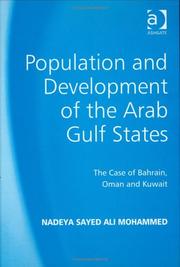| Listing 1 - 2 of 2 |
Sort by
|

ISBN: 0754632202 1351909959 1315246406 1138258482 9781351909952 9781315246406 9780754632207 9780754632207 9781351909938 9781138258488 1351909940 9781351909945 Year: 2016 Publisher: London : Routledge,
Abstract | Keywords | Export | Availability | Bookmark
 Loading...
Loading...Choose an application
- Reference Manager
- EndNote
- RefWorks (Direct export to RefWorks)
Bahrain --- Kuwait --- Oman --- Population --- Economic aspects. --- Economic conditions. --- Sultanate of Oman --- ʻUmān (Sultanate) --- Salṭanat ʻUmān --- Muscat --- Mascate --- عمان --- سلطنة عُمان --- オマーン --- オーマン --- Muscat and Oman --- Bakhreĭn --- Aval Island --- Baḥrayn --- Bahrein --- Dilmun --- Dawlat al Baḥrayn --- State of Bahrain --- بحرين --- Bahreyn --- Kingdom of Bahrain --- مملكة البحرين --- Mamlakat al-Baḥrayn --- Bahreyin --- Бахрэйн --- Каралеўства Бахрэйн --- Karaleŭstva Bakhrėĭn --- Бахрейн --- Кралство Бахрейн --- Kralstvo Bakhreĭn --- Bahrajn --- Bahrajnské království --- Bahreini Kuningriik --- Μπαχρέιν --- Bachrein --- Βασίλειο του Μπαχρέιν --- Vasileio tou Bachrein --- Baréin --- Reino de Baréin --- Barejno --- Reĝlando de Barejno --- Bahraingo Erresuma --- Royaume de Bahreïn --- De Barein --- Ríocht Bhairéin --- Bairéin --- Tylos --- البحرين --- al-Baḥrayn --- バーレーン --- Bārēn --- בחרין --- Koweit --- Kuwayt --- Kuvayt --- Kuveĭt --- Dowlat al Kuwait --- Dawlat al-Kuwayt --- State of Kuwait --- E-books --- Bahreïn --- Koweït --- Conditions économiques --- Каралеўства Бахрэйн --- Кралство Бахрейн --- Бахрэйн --- Бахрейн
Book
ISBN: 0801448824 0801462207 080147602X 9780801462207 9780801448829 9780801476020 9783377415004 3377415009 9780801462191 0801462193 Year: 2010 Publisher: Ithaca : ILR Press,
Abstract | Keywords | Export | Availability | Bookmark
 Loading...
Loading...Choose an application
- Reference Manager
- EndNote
- RefWorks (Direct export to RefWorks)
In City of Strangers, Andrew M. Gardner explores the everyday experiences of workers from India who have migrated to the Kingdom of Bahrain. Like all the petroleum-rich states of the Persian Gulf, Bahrain hosts an extraordinarily large population of transmigrant laborers. Guest workers, who make up nearly half of the country's population, have long labored under a sponsorship system, the kafala, that organizes the flow of migrants from South Asia to the Gulf states and contractually links each laborer to a specific citizen or institution.In order to remain in Bahrain, the worker is almost entirely dependent on his sponsor's goodwill. The nature of this relationship, Gardner contends, often leads to exploitation and sometimes violence. Through extensive observation and interviews Gardner focuses on three groups in Bahrain: the unskilled Indian laborers who make up the most substantial portion of the foreign workforce on the island; the country's entrepreneurial and professional Indian middle class; and Bahraini state and citizenry. He contends that the social segregation and structural violence produced by Bahrain's kafala system result from a strategic arrangement by which the state insulates citizens from the global and neoliberal flows that, paradoxically, are central to the nation's intended path to the future.City of Strangers contributes significantly to our understanding of politics and society among the states of the Arabian Peninsula and of the migrant labor phenomenon that is an increasingly important aspect of globalization.
SOCIAL SCIENCE --- Sociology / General --- Foreign workers, East Indian --- East Indians --- Ethnology --- Business & Economics --- Labor & Workers' Economics --- Violence against --- India --- Bahrain --- Emigration and immigration. --- Ethnic relations. --- Asian Indians --- Indians, East --- Indic peoples --- Alien labor, East Indian --- East Indian foreign workers --- Bakhreĭn --- Aval Island --- Baḥrayn --- Bahrein --- Dilmun --- Dawlat al Baḥrayn --- State of Bahrain --- بحرين --- Bahreyn --- Kingdom of Bahrain --- مملكة البحرين --- Mamlakat al-Baḥrayn --- Bahreyin --- Бахрэйн --- Каралеўства Бахрэйн --- Karaleŭstva Bakhrėĭn --- Бахрейн --- Кралство Бахрейн --- Kralstvo Bakhreĭn --- Bahrajn --- Bahrajnské království --- Bahreini Kuningriik --- Μπαχρέιν --- Bachrein --- Βασίλειο του Μπαχρέιν --- Vasileio tou Bachrein --- Baréin --- Reino de Baréin --- Barejno --- Reĝlando de Barejno --- Bahraingo Erresuma --- Royaume de Bahreïn --- De Barein --- Ríocht Bhairéin --- Bairéin --- Tylos --- البحرين --- al-Baḥrayn --- バーレーン --- Bārēn --- בחרין --- Каралеўства Бахрэйн --- Кралство Бахрейн --- Бахрэйн --- Бахрейн --- Indians (India)
| Listing 1 - 2 of 2 |
Sort by
|

 Search
Search Feedback
Feedback About UniCat
About UniCat  Help
Help News
News